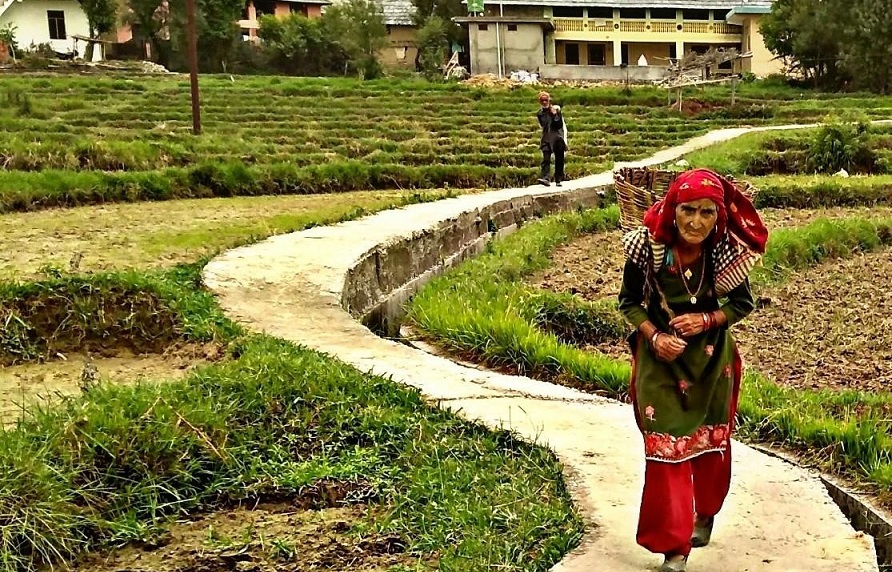
Chamarkhad is a small village with Schedule Cast majority in Kangra block-Palampur District (Himachal Pradesh). The majority of the SC population is a distinct feature of this village in the entire Kangra block.
I entered the village at around 10
am on my scooter. Most of the villagers were carrying bricks in their
traditional basket. After having a conversation with one male worker, I got to
know that the work was for Mahatma Gandhi National Rural Employment Guarantee
Act (MGNREGA). MGNREGA is a government of India measure which guarantees at
least 100 days of wage employment in rural areas. In Chamarkhad, there were
around ten-twelve women and only two men working on the site. The significant
presence of women over men left a lasting impression on me. I stopped my
scooter to have a conversation with the workers.
I approached an old lady. She was in her late 6Os as seen in the above image. In the same image, the old person who is walking behind is her husband. The couple works on their small agricultural land and also on the sites of MGNREGA. In the initial conversation, I got to know that she was satisfied with the fertility of the land, availability of water and yield from the land. She also mentioned it was more than enough for her needs. Knowing that she manages well in a small plot of land, I felt why she is working for MGNREGA? The old women with her broad smile exclaimed, “For daily and monthly expenses you need cash in your hand. If you are only dependent on agriculture you have to wait for at least four to six months till your yield gets sold in the market. On the contrary, in MGNREGA we get the monthly payment, with the MGNREGA payment we manage our daily expenses and the money which we get from agriculture get saved in the bank.” The excitement on her face was now pouring out. In her exhilaration, she took out her traditional purse made up of cloth. From the purse, she slowly took out her bank passbook and said, “I have 10 thousand rupees in my bank account.” That was a movement of pride and happiness for her. This particular moment was priceless!
Later on, I asked her, “What did she do before MGNREGA work?” The expression on her face started to change, her eyes pointed on a tree which was far behind. She said “I used to work on my land and in the land of upper-caste landowners in the villages next to ours. I used to walk daily at least 10 km. The wages were also very low as compared to what we get today from Sarkar(government).” She also wanted to say something about landowners but she murmured and stopped. To change the topic, I asked her about her children. The broad smile on her face came back. She said, “I have 3 daughters and 2 sons, all of them are married.” She pointed her fingers towards two fellow women who were working and said: “those are my two daughters-in-law.” I asked her about a greater number of females as compared to males. To this question, she gave me a surprised look and said, “Males go and work in the cities as there they get higher wages. We work here on the farm as well as for MGNREGA. If the government increases the MGNREGA wages then they might work here.” She pointed her finger towards him and said, “Now he is not fit to go and work in the city so he stays with us.” The old woman gave a slight idea about the feminization of agriculture and MGNREGA.
The conversation had a lasting impression on me for one more important reason. The passbook, yes, the passbook. The passbook that she showed me was engrossed in the dirt with many stains and inappropriate folding. It was not just a passbook; it was a symbol of economic independence for her. Having MGNREGA in the place she doesn’t have to rely on upper-caste male landlords to get her some work. By accessing work under MGNREGA a Dalit woman who is standing on the lowest rugs of the society is asserting her right to become economically independent in her ways. It is also a silent rebellion that is unfolding against historical oppression.
With these thoughts, I turned on my scooter and left the village with the thought of silent revolution the MGNREGA is bringing in a small Indian village.
Akshay is a Chief Minister's Good Governance Associate with the Government of Haryana. He has studied Public Policy and Governance from Azim Premji University, Bangalore. His areas of interest include governance and anthropology of the state.
Nice article Akshay… ground zero report is awesome.
Thank you Akshay for another insight. Got a positive vibe after understanding what’s exactly happening at the ground level. Hopefully acche din aagaye????????
Great work akshay… Really MGNREGA is a symbol of economic independence for rural development.( Specially for women )..